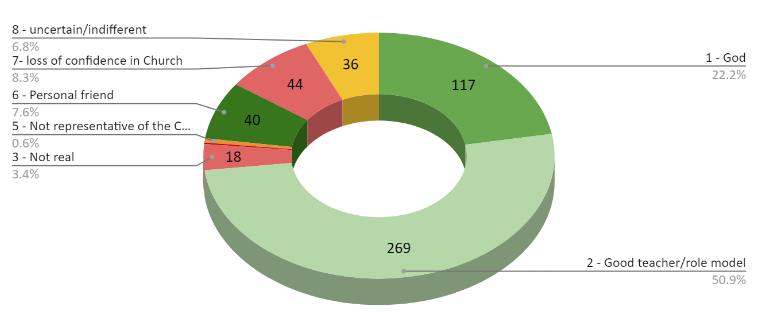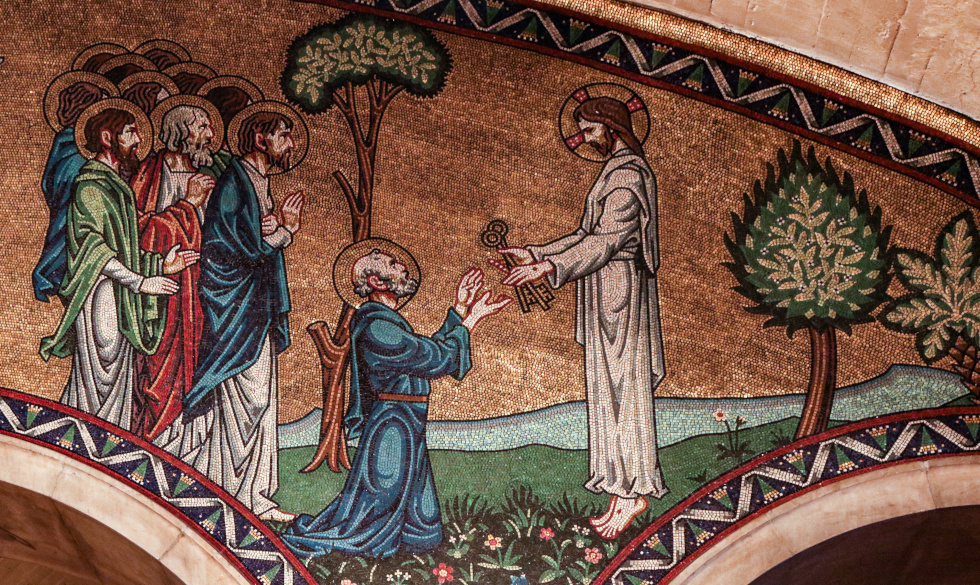At the time of the writing of this post (Aug. 2022) a document had been recently released by the Archdiocese of Halifax-Yarmouth titled “Findings of the Synod Process In the Archdiocese of Halifax-Yarmouth”.1 In the section under “CENTRALITY OF CHRIST & POWER OF THE HOLY SPIRIT” the question was asked “If you had to give your opinion of Jesus in a few sentences, what would you say?”. The breakdown of the responses, which were from people who attend church rarely or never, was as follows:

Only 117 responses out of over 500 opined that Jesus is God.2 Having said that, it is not clear how many of the other respondents do or do not believe that Jesus is God...it may have been a “given” for them or perhaps they do not in fact believe Jesus is God. However, given the decline in church attendance and the erosion of faith in our culture in general and even within the Catholic Church itself there are many who no longer believe or accept many of the Catholic Church’s teachings. For example, a recent survey by Pew Research Center showed only one-third of U.S. Catholics agree with the church that the Eucharist is the body, blood, soul and divinity of Christ.3 This is a central dogma of the Catholic Church.
So who is Jesus and what is his nature? Or, as Christ asked his apostles “but, who do you say that I am”. (Mat. 16:15)
In St. Paul’s letter to the Philippians he instructs us that Jesus, “though he was in the form of God, did not count equality with God a thing to be grasped, but emptied himself, taking the form of a servant, being born in the likeness of men.” Phi. 2:6-7.
We can get a good sense of the character of Jesus through the Gospels but that still leaves lots of questions. What does St. Paul mean when he wrote that Christ was “born in the likeness of men”? Although Jesus was a man, he could walk on water (Mat. 14:22-23), raise up the dead back to life (John 11:1-44), not only forgive sins but prove he had the power to do so (Luke 5:17-39) and he had insight into people’s thoughts and lives (John 4:29). During his time on earth Jesus was like us, but it also seems he was very different. How so? Did Jesus always know that he was God? Did he always know what his mission was, or did he have to figure that out? Was he like a “blank slate” when he was born and thus had to learn everything that he knew?
St. Thomas Aquinas, a Doctor of the Church, gives clear answers to many of these questions. First let’s look at what Aquinas has to say about the nature of Christ.
In all men save one the union of soul and body constitutes a hypostasis and suppositum, because in their case the hypostasis or suppositum is nothing else but these two components. But in our Lord Jesus Christ, besides soul and body, a third substance enters in, namely, the Godhead. In Him, therefore, the composite of body and soul is not a separate suppositum or hypostasis, nor is it a person. The suppositum, hypostasis, or person is that which is made up of three substances (namely the body, the soul, and the divinity). In Christ, accordingly, just as there is but one person, so there is but one suppositum and one hypostasis.4
(Note: hypostasis – is a Greek term meaning underlying reality or substance.5)
Here, what Aquinas is saying is that the underlying reality or substance of man, with one exception – Christ – is that we are a body-soul composite. Whereas with Christ his person is body-soul-divinity. However St. Thomas Aquinas goes on to point out another difference between Christ and all other men,
But the way His soul is joined to His body differs to the way His divinity is united to both. His soul comes to the body as its self-existing form, so that one nature, which is called human nature, is composed of these two. But the Godhead does not come to the soul and body as a form or part: this is against the very concept of divine perfection. Therefore the divinity and the soul and the body do not constitute one nature: but the divine nature, complete in itself and existing in its purity, too to itself, in a way that is incomprehensible and indescribable, the human nature composed of soul and body.6
Here Aquinas is differentiating between the person of Christ - body, soul and divinity and the natures of Christ - human and divine, whereas in all other men the nature and person are both composed of body and soul. So there are elements of Christ that we cannot fully understand except to say he is both man and God. That is, he has both human and divine natures, the former composed of body and soul and the latter the Godhead.
St. Paul’s words “being born in the likeness of men”, indicates that Christ as a man must have had limitations. So what were the deficiencies in the Body of Christ?
Christ’s body was like our own. He was subject to hunger, thirst, heat and cold, pain and death. Even though Christ was without sin he shared the “non-staining” punishments that were meted out to man. The purpose of this was to prove to us his humanity and set an example of “humble and patient endurance”.7 Furthermore, because he did not have the stain of original sin, these defects, which for us are an unavoidable part of the punishment for the sin of Adam, he willingly took on.8
Christ did not take on any defects that would mar “his perfect knowledge, grace, and dignity.” Thus he could not get any disease, or have any broken bones.9
Christ also had a human soul but in his soul there could be no sin – original or actual. In John 8:46 he asks the Jewish authorities “Which of you convicts me of sin?”.10 As well, when we face daunting situations we can be overcome by fear and flee doing what is right. This could not happen with Jesus.11 (Also Luke 22:42) And finally from the moment of the incarnation Jesus’ soul possessed the beatific vision – something we will not have until after our death – if we merit heaven.12
What was the scope of Christ’s knowledge in light of scripture and the fact that the person of Christ was and is true God and true man? First let’s look at the different types of knowledge and how they are arrived at.
The three kinds of knowledge. If the definitions below seem a bit hard to follow, don’t worry, they will be elaborated on further on in this post.
1. Infused knowledge – This is the kind of knowledge angels have. It has been infused in them by God at the moment they were created. It was not arrived at through the senses and reason. “When an angel considers a particular essence, he instantaneously exhausts everything there is to know about that essence to the degree of his power of intelligence”.13 [Essence – what a thing is.14]
2. Acquired knowledge – This form of knowledge is particular to men who are able to reason. “humans know first the individual things through their senses [taste, touch, smell, hearing and sight] and then from the individual things extract a universal concept or essence from those individual things; they intellectually know the individual by an act of judgment.”15 For example seeing green grass, a blue sky and a red sunset and coming up with the universal concept or essence of “colour”.
3. Beatific knowledge or vision – This is a direct and intuitive knowledge of God. "It is called vision in the mind by analogy with bodily sight, which is the most comprehensive of human sense faculties; it is called beatific because it produces happiness in the will and the whole being."16
As you can gather from the above only humans possess acquired knowledge. The knowledge angels possess was infused by God. What about Christ?
Jesus possessed all three forms of knowledge during his time on earth.
Infused knowledge of Christ.
Christ's human intellect is enriched with the fullness of infused knowledge. For, by reason of the hypostatic union [recall that is the union between body, soul and divinity], the human faculties of our Lord are as perfect as such faculties can possibly be; and to have infused knowledge is a perfection of the human mind. By divinely infused knowledge, Christas man knows all that any or all human minds can learn by the rational power (for instance, Christ perfectly knows all human sciences); he also knows all revealed truths, and all truths made known to the mind by the gifts of the Holy Ghost and the gratuitous graces.17
Christ had access to this knowledge and used it together with his reasoning ability to teach. “Our Lord did not need, here on earth, to think discursively, that is, to reason things out. [acquired knowledge] But he could and did use the reasoning method in expressing his knowledge for the benefit of others, thus to make clear to them the logical nature of his teachings.”18
Finally this infused knowledge was most complete.
The infused knowledge possessed by Christ as man is more excellent than the knowledge possessed by the angels, and this, both in extent, and in the perfection of pure certitude. For the spiritual enlightenment of Christ's human soul is more excellent, by reason of the hypostatic union [again, recall that is the union between body, soul and divinity], than that which is shed upon any other creature, human or angelic.19
Acquired knowledge of Christ.
Now, the human intellect does not grasp all things intelligible in a single instant, but goes on and on, by the process called abstraction, forming idea after idea. Thus human acquired knowledge increases. And so of Christ it is said in scripture (Luke 2:52), that he ‘advanced in wisdom . ..’20
Yet Christ was not a pupil; he was not really taught by any human being. He says (John 18:37): ‘For this was I born, and for this came I into the world, that I should give testimony to the truth.’ It was not suitable to the dignity of him who came to teach truth, that he should himself be taught by those he came to instruct.21
Since Christ was not taught by men or angels then how could he have human acquired knowledge?
Christ as man was not taught by men. Neither was he taught by angels. For his acquired knowledge, the angelic ministry is not required. For his infused knowledge, the hypostatic union fills his human soul with knowledge without the mediation of angels or any creatures. Christ's human acquired knowledge is acquired and possessed as a perfection of his perfect human nature, not as a necessity for his information.22
Jesus’ two natures and therefore his knowledge were not “compartmentalized”. That is, his divine nature was not hidden or cut off from his human nature. He had access to all of his knowledge at all times.
Beatific knowledge of Christ.
Jesus was always in possession of the beatific vision. "Since our Lord as man had the beatific vision from the beginning, He could understand in its light, without turning (as men on earth must do) to the sense-images called phantasms.”23 [Phantasm – “an image residing in the imagination.”24] and “Christ as man knows the divine Essence, not by infused knowledge, but by the direct and intuitive knowledge of the beatific vision.”25
And his human soul more perfectly beholds God than any other creature, “The human soul of Christ is united to the Word in Person; therefore it is more fully enlightened by the Word than any other creature. Therefore, the human soul of Christ beholds the divine Essence in vision more perfectly than any other creature in heaven.”26
When Christ was incarnated he was not just a “wise man” or a “good teacher/role model”. He had a mission. He knew who he was, where he came from and where he was going. This would have been necessary because he was God and he had a most difficult and important task – to rescue and redeem humanity from the dominion of Satan under whom humanity had been placed as a result of Adam’s sin. St. Peter’s answer to Jesus’ question, “but, who do you say that I am?” is the perfect example as to what ours should also be, “You are the Christ, the Son of the living God”. (Mat. 16:16)
Blog image credit: Fr Lawrence OP.
References
1. https://halifaxyarmouth.org/images/websections/pastoralplan/synod2022_reports/2022-08-11_FINAL_Local_Synod_Report_for_Publication_.pdf
2. ibid, p. 6.
3. https://www.pewresearch.org/fact-tank/2019/08/05/transubstantiation-eucharist-u-s-catholics/
4. Light of Faith. The Compendium of Theology, St. Thomas Aquinas. Sophia Institute Press, 1993, Manchester NH. P. 246.
5. https://en.wikipedia.org/wiki/Hypostasis_(philosophy_and_religion)
6. Light of Faith. The Compendium of Theology, St. Thomas Aquinas. Sophia Institute Press, 1993, Manchester NH. P. 246.
7. http://www.catholictheology.info/summa-theologica/summa-part3.php?q=57, paragraph 14.1.
8. Ibid, paragraph 14.3.
9. Ibid, paragraph 14.4.
10. http://www.catholictheology.info/summa-theologica/summa-part3.php?q=58, paragraph 15.1.
11. Ibid, paragraph 15.4.
12. Ibid, paragraph 15.10.
13. Dominion, Fr. Chad Ripperger. Sensus Traditionis Press, 2022, Keenesburg, CO. P. 6.
14. Ibid, p. 543.
15. Ibid, p. 7.
16. https://www.catholicculture.org/culture/library/dictionary/index.cfm?id=32115
17. http://www.catholictheology.info/summa-theologica/summa-part3.php?q=58, paragraph 15.1.
18. Ibid, paragraph 15.3.
19. Ibid, Paragraph 15.4.
20. http://www.catholictheology.info/summa-theologica/summa-part3.php?q=56, paragraph 12.2.
21. Ibid, paragraph 12.3.
22. Ibid, paragraph 12.4.
23. http://www.catholictheology.info/summa-theologica/summa-part3.php?q=58, paragraph 15.2.
24. Dominion, Fr. Chad Ripperger. Sensus Traditionis Press, 2022, Keenesburg, CO. P. 550
25. http://www.catholictheology.info/summa-theologica/summa-part3.php?q=58, paragraph 15.1.
26. http://www.catholictheology.info/summa-theologica/summa-part3.php?q=54, paragraph 10.4.






